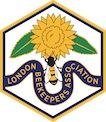
|
London Beekeepers' Association |

|
London Beekeepers' Association |
January in the Apiary[In the apiary, month by month.] Howard Nichols Food storesIf the colony went into the winter with 35lb of stores then feeding will not be necessary, even in this exceptionally mild winter with the bees flying. If stores were light a couple of months ago then it may be an entirely different matter. We have had yet another exceptionally mild autumn and winter so far. If feeding is necessary then only candy or fondant should be used at this time of year. Sugar syrup should be avoided as it will excite the bees and so disturb the cluster. The bees are also unable to process syrup in winter and it is then liable to fermentation. I personally would only feed my bees at this time of year if they were in danger of starving.New equipmentThose who have purchased equipment during the winter sales can assemble frames, etc. It is surprising how quickly events can move when the bees get going in spring and ready assembled equipment keeps the beekeeper ahead of any eventuality. Most sales will have ended but some suppliers may have a post-Christmas sale so it is still worth checking out the websites.Cleaning old equipmentBest time to do this is immediately after it is taken out of use in autumn. Attention to general cleanliness and maintenance of old equipment is part of apiary hygiene strategy. Please do check for evidence of wax moth and place frames in a cold place wherever possible.Candles and honey recipesFor those who process beeswax then winter is the usual time of year for this activity. Honey foodstuffs can, of course, be prepared and eaten at any time of year.EducationEducation and practical experience are the 2 routes through which beekeepers develop their skills. Education may arise from a variety of routes but Beecraft is a substantial resource. If you do not currently subscribe to Beecraft then January is a good month take out an annual subscription. Those who are also registered with the BBKA will receive the monthly BBKA News by post.Registration with BeebaseWe believe that all or virtually all of our beekeeping members are registered on Beebase. However, it is possible that a few newer members may not be. It is important that everyone is registered in case a notifiable disease or pest is found in your location. The Bee Inspectors are dependent upon them knowing the location of your hives and apiaries so that they may help you. Please do ensure you are registered as the high level of EFB in London is likely to be a continuing problem. |
©2025 London Beekeepers' Association |